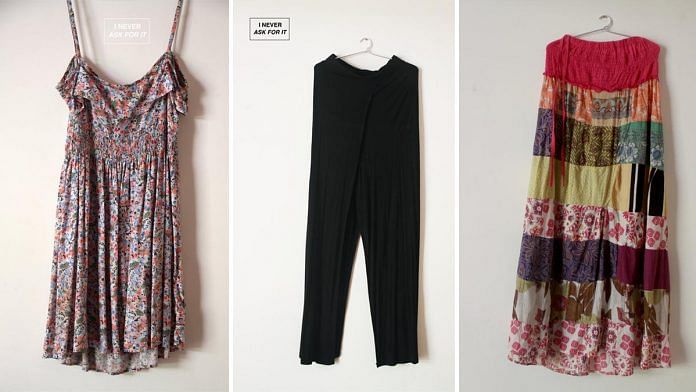
New Delhi: Shiv Sena leader Priyanka Chaturvedi, Aam Aadmi Party MLA Atishi, singers Sona Mohapatra, Ankur Tewari, and journalist Barkha Dutt were among the hundreds of people who expressed solidarity to end victim-blaming and shaming in crimes against women, as part of the social media campaign #INeverAskForIt.
In a ‘tweet-a-thon’ Monday, organised by Blank Noise — a community organisation working to eradicated gender-based and sexual violence — several people pledged to tackle victim-blaming and even shared video statements of solidarity.
Jasmeen Patheja, founder of Blank Noise, began the campaign against victim blaming in 2018 under the ‘I Never Ask For It’ banner. The primary aim of the campaign is the construction of an exhibition made up of the clothes women were wearing when they experienced any form of sexual violence.
Patheja plans to display 10,000 such items of clothing at India Gate by the year 2023.
“We envision 10,000 garments standing united at India Gate, knowing fully that it calls for being monumental,” said Patheja in an email statement.
“We want the building of this mission to be a process of healing; where survivors of violence feel heard and believed. The opposite of being blamed is being believed. The opposite of blaming is taking collective responsibility. We want the #INeverAskForIt mission to meet both these futures,” she added.
The many stories of sexual violence
In her tweet expressing solidarity with the campaign, Atishi wrote, “Asking survivors what they wore or what time it was, unfairly takes the blame off the sexual offender and places it on the victim.”
National Congress Party leader Supriya Shule also tweeted in support of the campaign highlighting that no man has the right to violate the dignity of women, no matter what time of the day it is or how a women is dressed or which part of world it is. Her thoughts were also echoed by Shiv Sena leader Priyanka Chaturvedi.
The easiest way to absolve oneself from the responsibility of seeking mindset& societal change is to blame the sexual assault survivors-judge her for her clothes, the time she was out, her attitude, her free spiritedness, her ambition.
Time to end this.
#INeverAskForIt— Priyanka Chaturvedi (@priyankac19) November 23, 2020
Twitter India’s policy head Mahima Kaul also shared the pledge tweet to end victim-blaming using the hashtag.
People also shared their stories of sexual abuse with photos of the clothes they were wearing at the time, to support the campaign. Many other journalists, celebrities and politicians endorsed the campaign by sharing their own stories of sexual violence.
"You will not believe your own daughter but you will believe that man?" We have the power to create culture that believes survivors.⁰Most incidents of violence go untold due to the fear of being blamed & shamed. This is everyday. Unite to end blame. Today. #INeverAskForIt TW pic.twitter.com/ZOavxC6F7t
— Blank Noise #INeverAskForIt (@BlankNoise) November 23, 2020
That this even needs to be said. So say it, again and again and again. There is no dress, no relationship, no context, no hour, no moment, no gray zone. #INeverAskForIt
— barkha dutt (@BDUTT) November 23, 2020
In school uniform, in salwar kameez, in skirt, in jeans, a rapist will rape you in any attire because it’s about him and not about you. You never ask for it, #INeverAskForIt, no woman ever asks for it.
Stop victim blaming.
— Sonam Mahajan (@AsYouNotWish) November 23, 2020
"I Never Ask For It" is a project making clear that a woman's choice of clothing has nothing to do with risk of sexual assault.#INeverAskForIt
— Vidya Chavan (@Vidyaspeaks) November 23, 2020
Subscribe to our channels on YouTube & Telegram
Why news media is in crisis & How you can fix it
India needs free, fair, non-hyphenated and questioning journalism even more as it faces multiple crises.
But the news media is in a crisis of its own. There have been brutal layoffs and pay-cuts. The best of journalism is shrinking, yielding to crude prime-time spectacle.
ThePrint has the finest young reporters, columnists and editors working for it. Sustaining journalism of this quality needs smart and thinking people like you to pay for it. Whether you live in India or overseas, you can do it here.